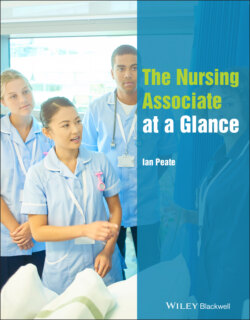Читать книгу The Nursing Associate at a Glance - Ian Peate - Страница 18
ОглавлениеChapter 6 Health and well‐being: self‐care
At the point of registration, the Nursing Associate will be able to: understand the professional responsibility to adopt a healthy lifestyle to maintain the level of personal fitness and well‐being required to meet people’s needs for mental and physical care.
Figure 6.1 Some components of good health and well‐being.
Top Tip
The Nursing and Midwifery Council’s (NMC’s) health declaration enables them to determine that those applying to join, renew or be readmitted to the register meet their requirements for health to ensure they can practise safely and effectively.
The Nursing and Midwifery Council (NMC)
The health and well‐being of any workforce is important. The Nursing Associate needs to look after themselves as well as others. This is also important when they are managing others; the well‐being of other staff becomes an added concern. At the point of registration, the NMC Code requires all Nursing Associates to maintain a level of health that permits them to undertake their role effectively as well as engaging in health promotion with patients.
In order to be on the NMC’s register, the Nursing Associate must meet a range of professional standards, and one of these concerns is health. Those on the register are part of a profession that has nationally recognised standards that are set by law. When the NMC say that a person is capable of safe and effective practice, they mean that they have the skills, knowledge, character and health to work in their profession safely and effectively.
When an approved programme of study has been successfully completed by the Nursing Associate, this does not guarantee that they will be able to register. Sometimes when a trainee Nursing Associate has completed an education programme and declares information to the NMC, their application may be rejected. All trainee Nursing Associates seeking registration (or once qualified during revalidation) are to be of good health to satisfy the NMC that they are capable of safe and effective practice. The NMC’s concern is whether the Nursing Associate has a health condition and/or disability which could affect practice. The NMC needs to be able to assess whether it may place at risk the safety of those they offer care and support to.
The interest in health and well‐being over the recent years has gathered momentum significantly with a growing body of evidence that has demonstrated a link with working conditions, support offered by managers and staff engagement with patient outcomes.
Health and well‐being
Wellness is so much more than being simply free from illness. ‘Health’, according to the World Health Organization (2019) is ‘a state of complete physical, mental and social well‐being and not merely the absence of disease or infirmity’.
The WHO definition explicitly links health with well‐being, seeing health as a positive aspiration; health therefore is a means to living well, highlighting the link between health and participation in society, as a human right that requires physical and social resources to achieve and maintain. ‘Well‐being’ refers to a positive rather than neutral state.
Resilience
Resilience is the capacity to bounce back from adversity; sometimes it is also known as emotional resilience. Protective factors increase resilience, and risk factors increase vulnerability. Resilient individuals, families and communities are more able to deal with difficulties and adversities than those with less resilience (University College London 2014). Resilience is associated with the ability to face adverse situations whilst remaining focused, continuing to be optimistic for the future. See also Chapter 8 of this text.
Self‐care
The Nursing Associate needs to consider those factors that impact upon their own health; this is sometimes known as self‐care. There are several resources available that can help support the Nursing Associate and other nursing staff to take ownership of their own health (physical or/and mental), encouraging them to take the time to apply the same level of care to their own well‐being just as they would do for the people they care for and offer support to. The focus needs to on body, mind, heart, work, career, spirit and balance. Figure 6.1 provides an overview of some of the components of healthy living that may lead to enhanced well‐being.
The Royal College of Nursing have produced a ‘Healthy You Assessment Worksheet’. The self‐assessment offers an overview of effective strategies to maintain a healthy you. The lists are not definitive, only suggestions. When completing the assessment, choose one item from each area that you will actively work on to improve.
